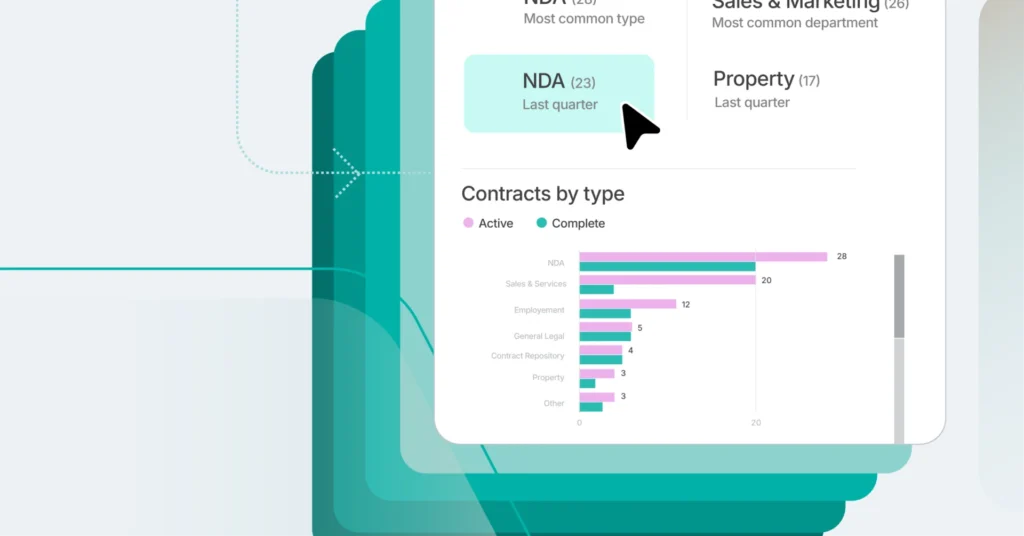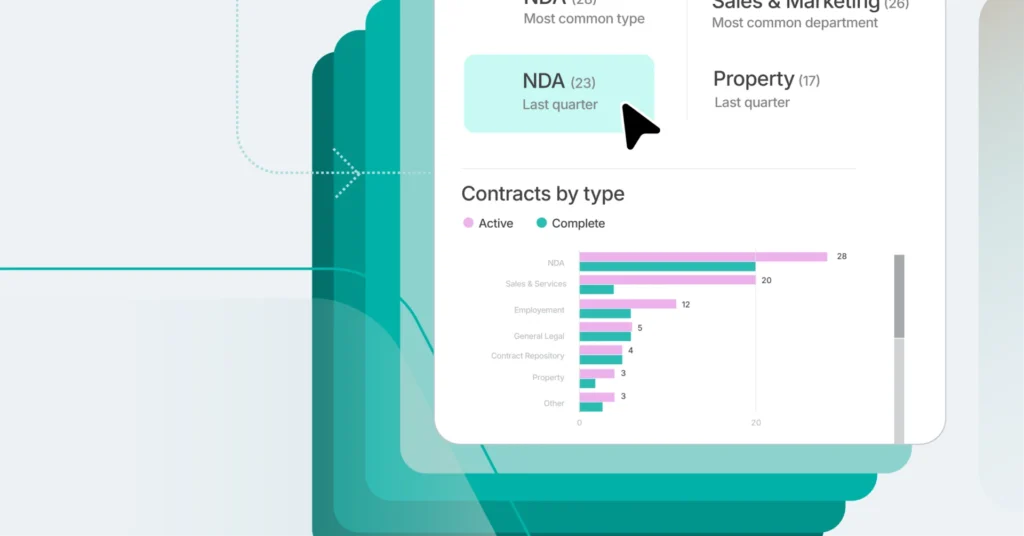7 reasons to combine your contract management and matter management together in one system
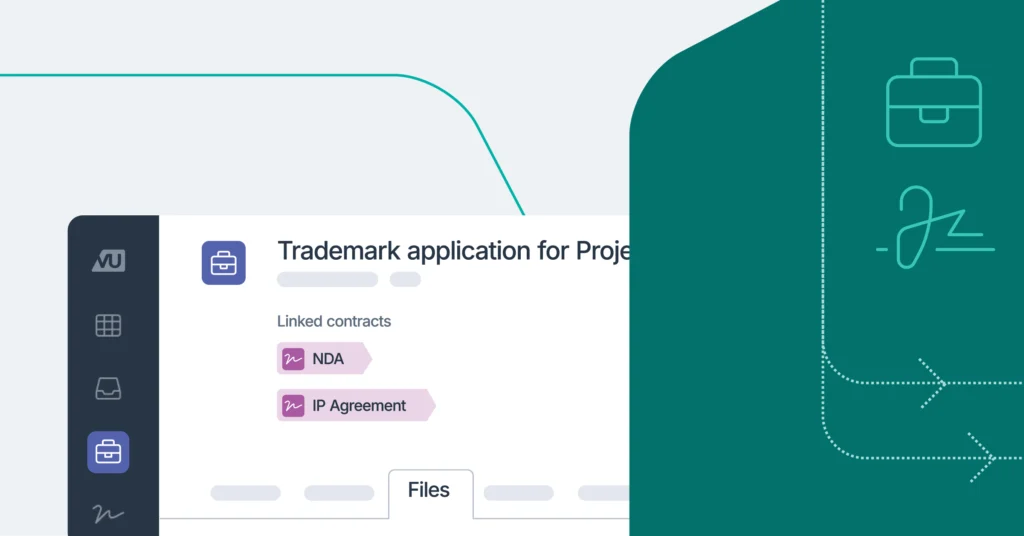
In this time of economic uncertainty and rapidly transforming business conditions, the pressure is mounting for corporate legal teams. Building resilience, optimizing efficiency, and increasing productivity has become more necessary than ever before – because freeing up strategic time and delivering business value at scale is critical.
One way that legeal teams can successfully manage these conditions is to choose in-house legal technology that combines the best features and capabilities of contract management and matter management software in one platform.
While the fundamentals and benefits of a contract management system are often understood, the next step is to understand why and how combining contract management and matter management through the same platform delivers superior ROI and better business value.
Combining contract management together with matter management, why now?
The Association of Corporate Counsel Chief Legal Officers Survey 2025 reports that four in ten legal departments will implement new legal technology in 2025, with a majority planning to implement contract management and just 36 percent planning to implement a matter management system. At the same time, the report highlights that 35 percent of CLOs globally identified operational efficiency as their department’s top strategic initiative for the next year.
Given the drive to adopt contract management software and the value of matter management solutions, the option of an in-house legal tech solution that combines contracts and matters on one platform is a sensible and economical choice that will better serve legal departments and their businesses, compared to single point solutions.
Let’s dive into the benefits of combining your contract management and matter management software.
1. Contract management together with matter management reduces costs
The 2024 In-house Legal Technology Report showed that, despite a clear perception among respondents that consolidated solutions deliver clear efficiency gains, many teams continue to nonetheless rely on multiple technology sources. This fragmented approach to legal technology is causing myriad pain points for legal teams, with 33 percent saying they experience inefficiency as a result of using multiple platforms.
With contract management point solutions being so popular, legal teams are becoming burdened with multiple, disconnected vendors to manage all of their work — and as we all know, legal work is not all about contracts!
By selecting a platform like a legal workspace, which allows for contracts and matters to be managed together, you can eliminate the need for several point solutions to manage contracts, documents and spend separately, as all of your legal work can now be managed in one place.
As a result, costs are reduced – there’s no need to pay for multiple subscriptions from different vendors. You’re able to consolidate subscription fees and renewals with just one provider, instead of paying separate, expensive subscriptions.
Legal teams will also save time as a result of consolidating work in one place: and that time is worth money.
Lower cost = Greater ROI
“Matters and Contracts in one workspace is just more cost-effective; it’s less effort and time to implement, and it’s one simple interface where both the legal team and the business work more efficiently…no one wastes time duplicating work, looking for information in multiple places, or consolidating reports…everything is right there.” Matt Brasch — Associate General Counsel, Buckle
2.Contract management together with matter management yields unique time savings
The current focus on operational efficiency coupled with growing costs of outside counsel and higher workloads means one thing – there’s an even greater need for corporate legal to work more efficiently, produce more work with fewer resources, and save time.
But when contract management and matter management solutions exist as disconnected tools, valuable time is wasted switching between the two solutions.
According to the 2024 In-house Legal Technology Report, 70 percent of in-house legal teams spend over one hour per day jumping between various systems to obtain a complete view of all legal work.
The report also reveals that further precious time is wasted on manual daily tasks, many of which are related to contracts and matters. 81 percent of respondents admitted that they spend more than an hour every day on back and forth with the wider business – either to gather complete information or update stakeholders on the status of work. Compiling assets needed for reporting and drafting and reviewing routine or low risk contracts also both take up valuable time.
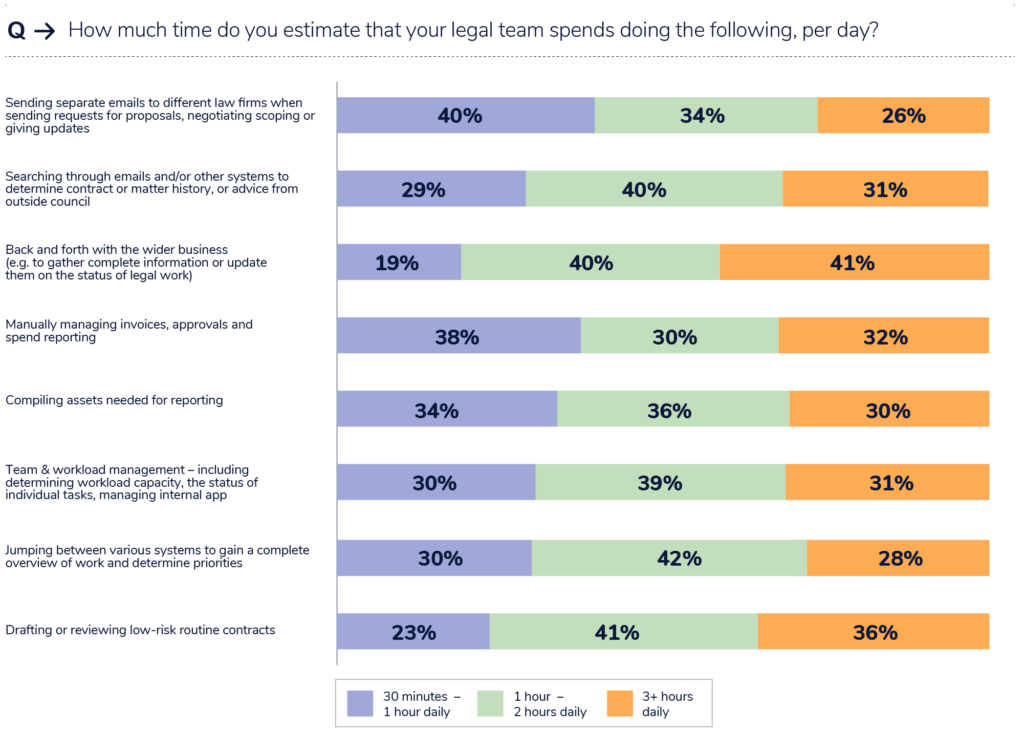
In fact, 77 percent of all respondents believed that the time they spend on manual daily activities takes time and effort away from working on larger business goals, or affects their ability to deliver services on time.
When contracts and matters are managed together on the same platform, such as a legal workspace, you get time back that would otherwise be spent switching between systems. There’s visibility across all your legal work – not just its isolated contract-related components.
With less time spent jumping between systems, consolidating data and switching workflows, the cost savings are real.
With an in-house matter management system, you enjoy streamlined intake and triage, collaboration within matters, and matter grids to filter and save views. Add this together with contract lifecycle management (CLM), self-service contract creation, and contract approval workflows, and you have a powerful — and time-saving — combination.
Higher ROI = more time
Every hour lost to inefficient workflows adds up, slowing down service delivery and pulling you away from higher-value work. This translates into a heavy financial burden for your organization – one which can be quantified. You can use a tool like the legal efficiency and savings calculator to put a dollar amount on the value of time wasted on administrative and manual tasks.
3. Contract management together with matter management amplifies workflow efficiency
It’s widely accepted that workflow processes are at the heart of every efficient business. Contract management software enables the automation of the contract processes or workflows from drafting to execution, providing an audit report for any approvals given.
Integrated matter management adds to the efficiency of your legal team by streamlining all of the other legal work that isn’t specific to contract management – such as centralizing knowledge management, consolidating intake and requests, managing documents, and automating workflows for tasks, actions, and reporting. The benefits of investing in matter management software are significant, and largely a result of workflow efficiency and better visibility for the vast majority of a corporate legal team’s legal workload.
In addition, having contracts and matters in one place enables legal leaders to better manage team capacity, as they are able to access a holistic view of what all team members are working on, and can adjust workloads accordingly.
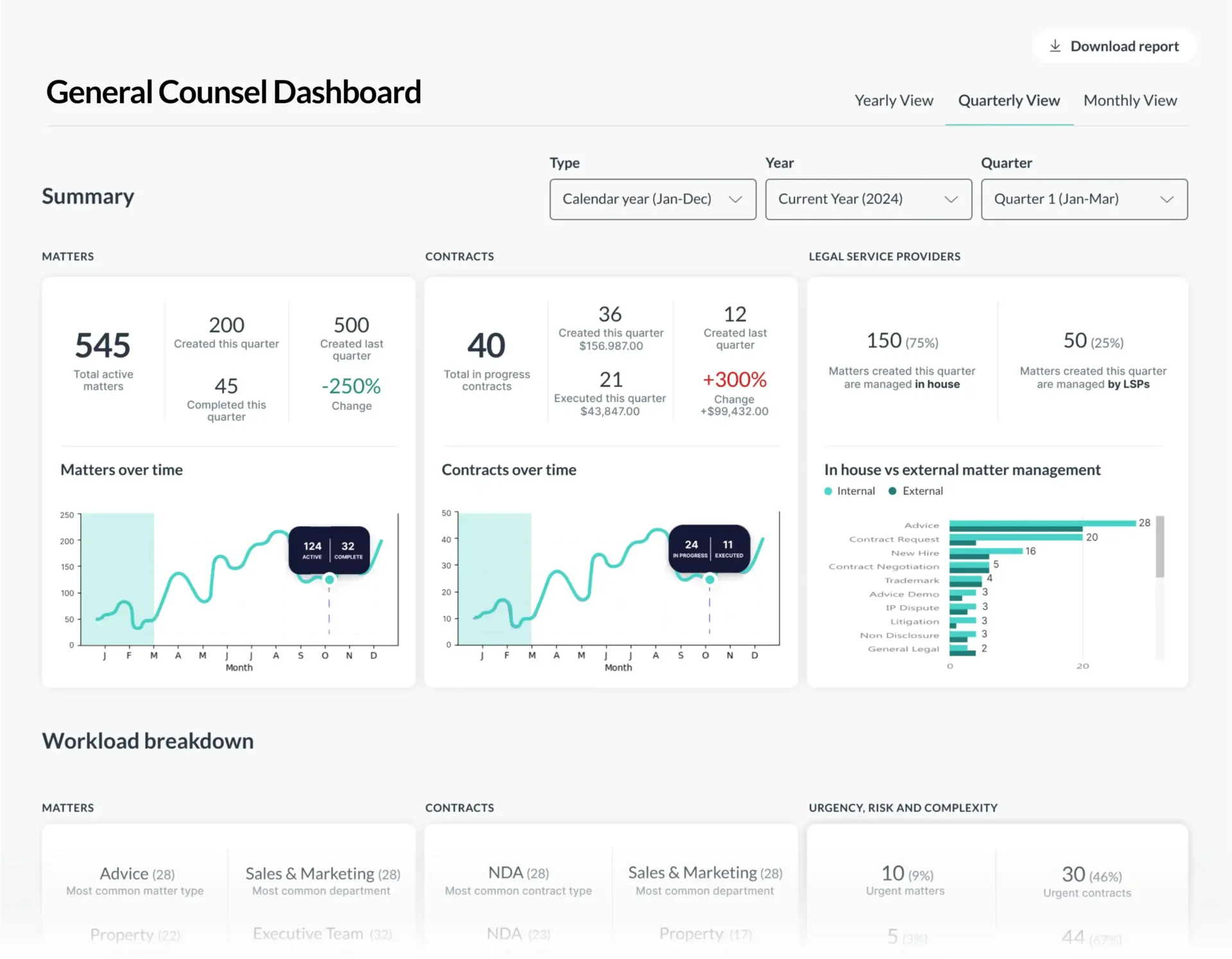
It’s clear that managing matters and contracts in the one legal workspace provides even greater workflow benefits than a single contract lifecycle management solution or matter management software. But wait – there’s more.
4. Integrated contracts and matters add context and influence better outcomes
The benefits of being able to streamline more than one key workflow that you might buy a legal software solution for are fairly obvious. But what about a contract’s history? Where’s all the information, contained in emails and documents, that exists before a contract’s creation, and shapes all negotiations before and in the future? If a contract is disputed down the line, where do you find all the details that provide context? What if outside counsel is invovled? This context needs to be captured, along with the workflow that comes out of the contract — and this is where matter management comes in.
Matter management allows a user to collate data, information, files, and communications about that business initiative into a single place, and present it in a way that is easily retrievable and reportable. Here are some of the biggest advantages that come with contextualizing your contracts and matters:
- A system of record that provides one source of truth, enabling the tracing of a contract’s history through related matters from draft to execution and beyond.
- Continuity of care and knowledge, ensuring that if a colleague is away or leaves the organization, all the information is readily available on the legal workspace and not lost in inboxes or left forgotten on a hard drive.
- Preserves the original intent of the contract, with all matters, emails, documents, and files able to be easily retrieved and reviewed.
- Saves time, as there is no need to search through emails, folders and hard drives to find the context for each contract.
- Facilitates the timely resolution of disputes, as all information about the contract is captured and connected to the contract.
5. Contract management together with matter management produces better data and legal analytics
Data is critical for today’s in-house counsel, especially legal leaders. With peers in marketing, sales, and operations already fluent in data-driven leadership, general counsel are increasingly expected to run the legal function “like a business” – and that requires metrics, KPIs, and reporting.
In addition, legal leaders who use data to represent the value of the legal function at executive leadership level have an opportunity to elevate their position as strategic business partners and increase the legal function’s impact on the business. But leveraging data can be a challenge – structured data is often unavailable or difficult to access, and time-consuming processes and specialist skills are required to aggregate data and create impactful reports.
In fact, 66 percent of respondents to the 2024 In-house Legal Technology Report say they spend more than an hour a day compiling assets needed for reporting, with 30 percent spending three or more hours a day on it.
Technology that is purpose-built to handle both matter and contract management will naturally generate a more comprehensive data set – one that is more fully representative of all your legal work – without burdening anyone with administrative tasks. This reduces the time it takes to get a unified view of activity and metrics across all legal work.
What’s more, an integrated solution with good dashboards and out of the box visualizations will make it easy to spot trends, surface insights, and share foundational reports which showcase the entire workload and value the legal team delivers.
“While a CLM can provide valuable information, it’s very much a partial picture; without matter management you lack visibility into most of your team’s workload, which means that you are less likely to make accurate and effective decisions.” – David Lancelot, CLO and EVP Advocacy, LawVu
6.Contract management together with matter management helps you to better leverage AI
With legal teams reporting efficiency as their top priority, artificial intelligence tools that are integrated into in-house legal technology or more specifically, power contract management capabilities, present a significant opportunity to streamline process-driven tasks, eliminate time spent on low-level admin, and focus on the strategic work that matters most to their organizations.
Multiple AI use cases are now proven to safely optimize in-house legal work, applied in valuable ways within many different types of legal software solutions – including e-billing and spend management, contract lifecycle management, and matter management software. If AI features enhance any one of these specific types of in-house legal software point solutions, it stands to reason that when an AI tool is embedded in a platform that unifies multiple workflows, you’ll simply get more value from it. There are three more ways that extra value is created when contracts and matters are managed together:
- Greater efficiency: One of the biggest challenges with multiple point solutions is that the more tools you’re working with, the more time you have to spend navigating between them. If you add standalone AI tools to the mix, you’re amplifying the issue. Whereas a solution that embeds AI to support multiple use cases delivers the benefits of AI without adding complexity to your tech stack or time to your day.
- Better data for your AI to work with: Data is foundational to all legal tech, but data and AI have an amplified relationship. By consolidating all of your data from across your legal work into one truly unified source of truth, you’ll elevate the impact of your AI tools. For example: An AI-powered analytics tool will be more efficient, comprehensive, and insightful when it can answer questions and track KPIs across matters and contracts at once.
- Confidence in secure adoption: like any legal software, the value of AI comes from successful implementation and adoption, and security is non-negotiable. If you have one solution to manage both matters and contracts with embedded AI, there’s one less obstacle in the way when it comes to change management and training – your team can swiftly pick up the benefits within pre-existing workflows. And your IT and security posture is already handled by one trusted vendor.
7. Contract management together with matter management is better for your business partners
Legal teams report significant value from legal technology solutions that help you streamline the intake process and funnel all legal requests to one place – but your chance of success is even greater if your business only has to go to one place for all their legal needs. This is because just like the legal team, the rest of the business is inundated and overwhelmed with multiple technology solutions. With matter management and contract management integrated in one system, your business can access a single piece of software to:
- Submit legal requests for any type of work, from advice to contract review
- Take advantage of self-service for everything, including access to legal policies and advice in the same system as automated contract creation and e-signature
- Collaborate and stay on top of legal work alongside the legal team, using workflow features like embedded conversations, portals that make status and next steps easily visible, and notifications for invoice and contract approvals and key dates.
All this capability in one place is a win/win for legal and the business: your business users are more likely to use your solution, generating the time savings and structured data your legal team is looking for; it’ll also save them valuable time, because they won’t need to jump between systems or wonder where to go for legal work.
“[the business] see the value in LawVu because they have a system to go to. Response times are now faster, and there is stronger collaboration between teams because they can go into LawVu and see the status of their matter and contract rather than sending emails back and forth.” – Charmaine Shyu, Property Finder
Ready to combine your contract management and matter management together into one system?
LawVu is the only software provider offering both contract management and matter management together in a fully unified, easy-to-use system. To learn more about working smarter and to get time back with contracts and matters in one connected legal workspace, click here.
Alternatively, learn more about the fundamentals of connecting matters and contracts together (including use cases and tips and tricks on how to do it inside your legal workspace) as part of the Legal Tech Fundamentals Certification. It’s free, and can be completed in your own time!

